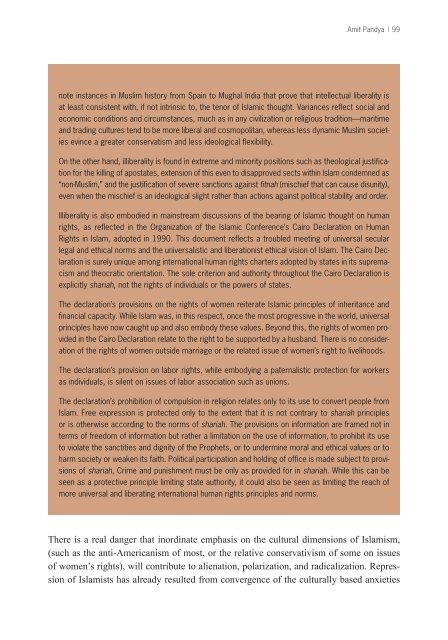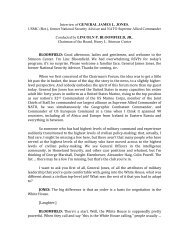Islam and Politics - The Stimson Center
Islam and Politics - The Stimson Center
Islam and Politics - The Stimson Center
You also want an ePaper? Increase the reach of your titles
YUMPU automatically turns print PDFs into web optimized ePapers that Google loves.
Amit P<strong>and</strong>ya | 99<br />
note instances in Muslim history from Spain to Mughal India that prove that intellectual liberality is<br />
at least consistent with, if not intrinsic to, the tenor of <strong>Islam</strong>ic thought. Variances reflect social <strong>and</strong><br />
economic conditions <strong>and</strong> circumstances, much as in any civilization or religious tradition—maritime<br />
<strong>and</strong> trading cultures tend to be more liberal <strong>and</strong> cosmopolitan, whereas less dynamic Muslim societies<br />
evince a greater conservatism <strong>and</strong> less ideological flexibility.<br />
On the other h<strong>and</strong>, illiberality is found in extreme <strong>and</strong> minority positions such as theological justification<br />
for the killing of apostates, extension of this even to disapproved sects within <strong>Islam</strong> condemned as<br />
“non-Muslim,” <strong>and</strong> the justification of severe sanctions against fitnah (mischief that can cause disunity),<br />
even when the mischief is an ideological slight rather than actions against political stability <strong>and</strong> order.<br />
Illiberality is also embodied in mainstream discussions of the bearing of <strong>Islam</strong>ic thought on human<br />
rights, as reflected in the Organization of the <strong>Islam</strong>ic Conference’s Cairo Declaration on Human<br />
Rights in <strong>Islam</strong>, adopted in 1990. This document reflects a troubled meeting of universal secular<br />
legal <strong>and</strong> ethical norms <strong>and</strong> the universalistic <strong>and</strong> liberationist ethical vision of <strong>Islam</strong>. <strong>The</strong> Cairo Declaration<br />
is surely unique among international human rights charters adopted by states in its supremacism<br />
<strong>and</strong> theocratic orientation. <strong>The</strong> sole criterion <strong>and</strong> authority throughout the Cairo Declaration is<br />
explicitly shariah, not the rights of individuals or the powers of states.<br />
<strong>The</strong> declaration’s provisions on the rights of women reiterate <strong>Islam</strong>ic principles of inheritance <strong>and</strong><br />
financial capacity. While <strong>Islam</strong> was, in this respect, once the most progressive in the world, universal<br />
principles have now caught up <strong>and</strong> also embody these values. Beyond this, the rights of women provided<br />
in the Cairo Declaration relate to the right to be supported by a husb<strong>and</strong>. <strong>The</strong>re is no consideration<br />
of the rights of women outside marriage or the related issue of women’s right to livelihoods.<br />
<strong>The</strong> declaration’s provision on labor rights, while embodying a paternalistic protection for workers<br />
as individuals, is silent on issues of labor association such as unions.<br />
<strong>The</strong> declaration’s prohibition of compulsion in religion relates only to its use to convert people from<br />
<strong>Islam</strong>. Free expression is protected only to the extent that it is not contrary to shariah principles<br />
or is otherwise according to the norms of shariah. <strong>The</strong> provisions on information are framed not in<br />
terms of freedom of information but rather a limitation on the use of information, to prohibit its use<br />
to violate the sanctities <strong>and</strong> dignity of the Prophets, or to undermine moral <strong>and</strong> ethical values or to<br />
harm society or weaken its faith. Political participation <strong>and</strong> holding of office is made subject to provisions<br />
of shariah, Crime <strong>and</strong> punishment must be only as provided for in shariah. While this can be<br />
seen as a protective principle limiting state authority, it could also be seen as limiting the reach of<br />
more universal <strong>and</strong> liberating international human rights principles <strong>and</strong> norms.<br />
<strong>The</strong>re is a real danger that inordinate emphasis on the cultural dimensions of <strong>Islam</strong>ism,<br />
(such as the anti-Americanism of most, or the relative conservativism of some on issues<br />
of women’s rights), will contribute to alienation, polarization, <strong>and</strong> radicalization. Repression<br />
of <strong>Islam</strong>ists has already resulted from convergence of the culturally based anxieties

















